The Poetry of Emily Dickinson (Part 2)
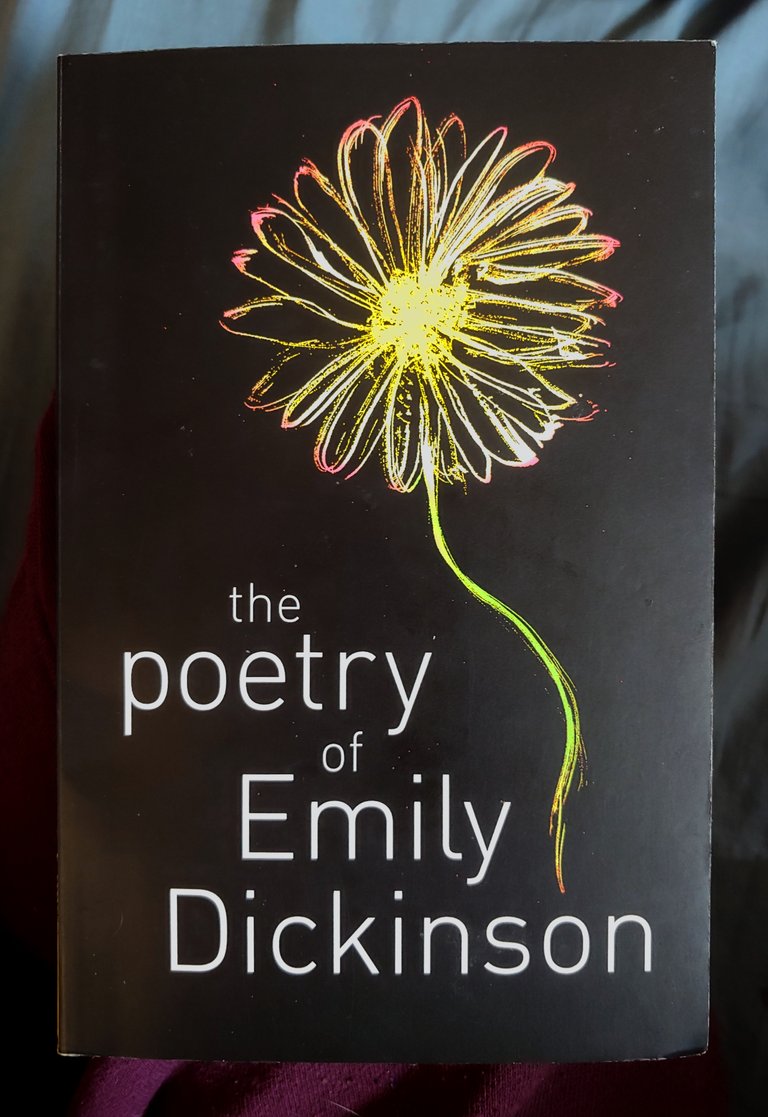
This is the second (and last) installment on my analysis of Emily Dickinson's poems 🙂 I will not dilly dally, but if you would like to check out the first part, you can do so here:
https://ecency.com/hive-180164/@borderline.babe/the-poetry-of-emily-dickinson
Then, without further ado, let's jump right into it!
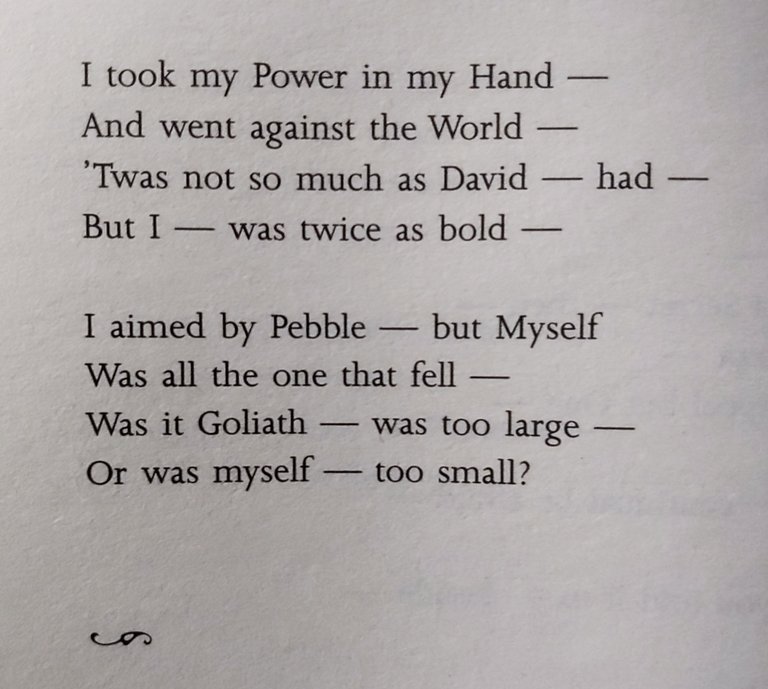
In this poem, it would appear that Dickinson had made a very bold decision, a decision that went against the rest of society. It is a feeling that we can all relate to sooner or later; the feeling that "it's me against the world."
She uses the analogy of the Biblical story, David and Goliath, to compare her situation. If you are unfamiliar with the story, it is about David, a small shepherd, who goes to fight Goliath, a huge and terrifying soldier. Despite having zero military training, David faces Goliath with nothing more than a slingshot and 5 stones. He ends up striking Goliath right in the forehead, knocking him dead.
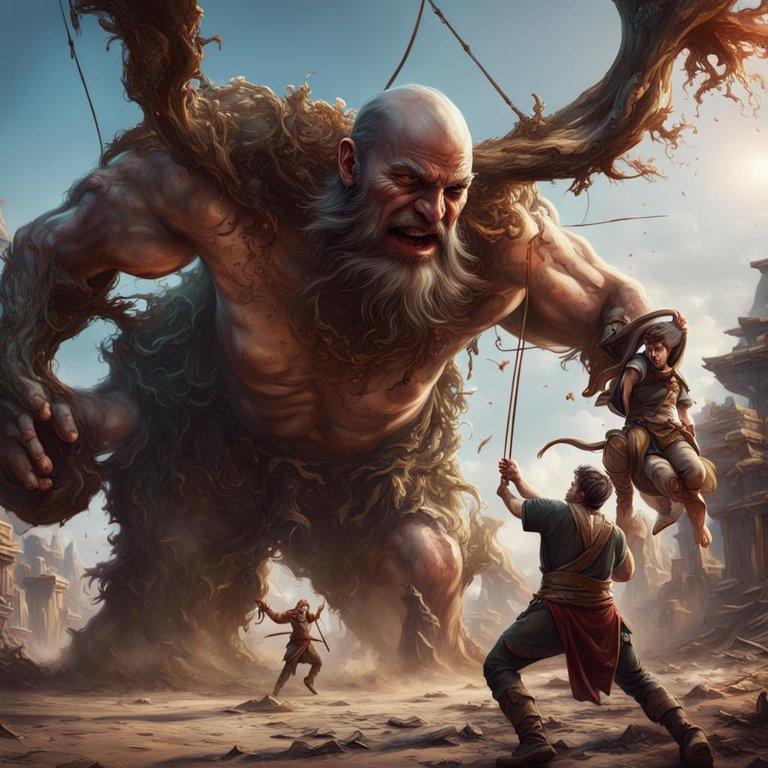 (All images were created using an AI art generator on Night Cafe)
(All images were created using an AI art generator on Night Cafe)
Returning to the poem, Dickinson compares her boldness to that of David's, only she believes herself to be twice as bold as he because she has had to face the entire world, as opposed to one person. The story of Goliath is already terrifying enough; what on earth could Emily have faced that could have been worse than that?
However, the final stanza reveals that, despite her courage, Emily ends up being the one to "fall," or fail. She ponders how this could have been in the last two lines of the poem: had her problem been too great, or had Emily been too weak to handle it?
As I stated previously, the feeling of "me against the world" is one that everyone faces sooner or later. Nowadays, with the advancement of technology and the internet, it is even easier to achieve the feeling. I personally do it all the time 😂 Not intentionally, for the most part, but sometimes I get caught saying some controversial things. The feeling of being mobbed by tens -- or even hundreds -- of other people can be quite intimidating.
I never take back the things that I say; I always mean what I say, and I stand by it. Yet sometimes it is difficult not to feel defeated. Sometimes it feels like I'm the only person in the world with common sense, and I feel defeated that people don't share the same perspective as myself. At the same time, I acknowledge that it does take a lot of courage to stand up for what I believe in especially when it is a belief that everyone else disagrees with. I know that Emily led a rather controversial life herself. She rejected not only traditional female duties, but even religion itself. I feel that I can relate to Emily a lot in this sense; being ostracized for living how one chooses, despite never having brought harm to anyone.
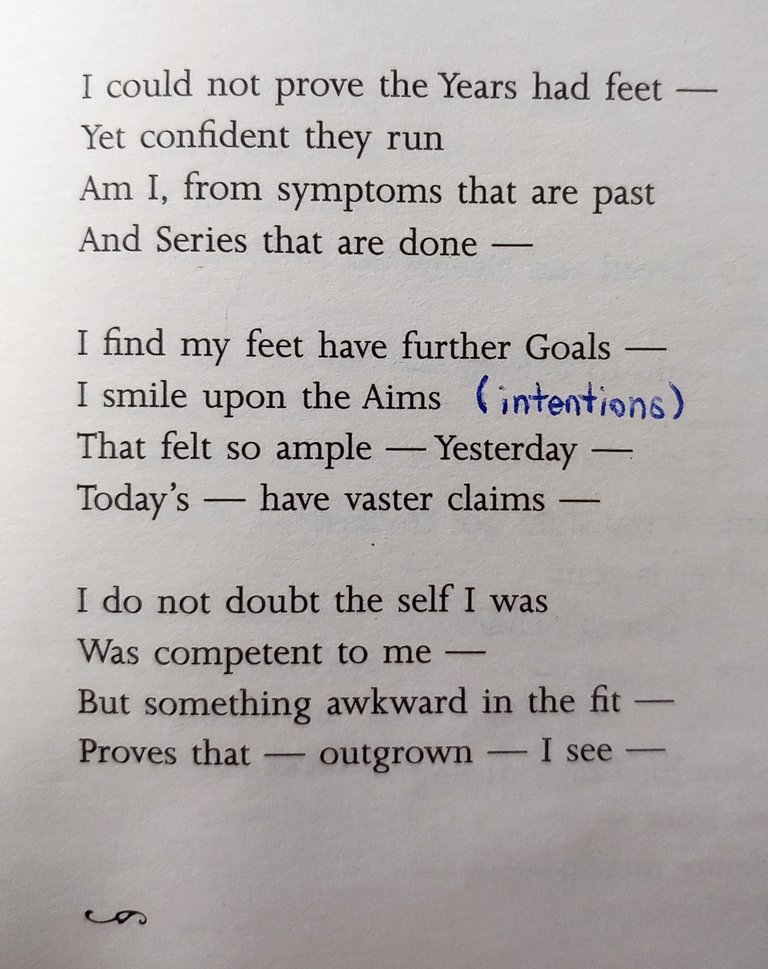
In this poem, Dickinson appears to be reflecting on the passage of time, how the years seem to have "feet" and have run right by her. She notes that her own feet seem to move faster than she can keep up, for the goals that she had just yesterday are no longer the same ones she has today. Emily acknowledges that her past self, her past motivation, was adequate for that moment, but now she has outgrown that version of herself.

This is a poem that is universally relatable. From the moment we are born we constantly grow, and it becomes inevitable that we change in many different ways. Obviously we cannot be the same people that we once were as babies! 😄 Sometimes the heart and mind are fickle -- the things that once kept us content, the dreams that we once had in mind -- are always changing. Like Emily noted, something that was once "adequate" becomes "awkward" because it no longer serves a purpose; we outgrow them. Sometimes it happens faster than we can keep up!
I think about myself; for the longest time, my goal was to be as independent as possible. I never wanted to have children. I didn't want to be held down by a job, or a relationship. I valued my personal space and freedom too much.
Then I met the love of my life; my goals changed. Suddenly the idea of living independently didn't seem as appealing. I was open to the idea of having children, so we did! We plan on living on the road as a family, in a motor vehicle. Within the span of only knowing my then-boyfriend for several months, my entire life's purpose had changed. Now, 4 years later, we have 2 baby girls together and plan on having more -- the years truly do have feet!
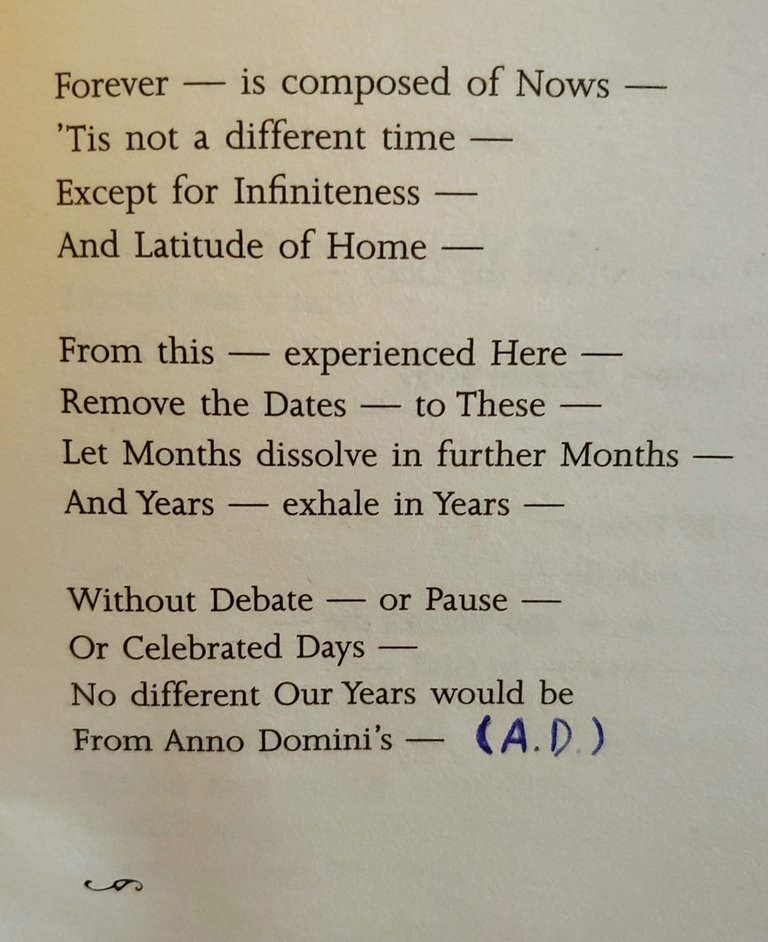
In this poem, Dickinson reflects on the word "forever." She believes that forever is not a distant moment in time, but is unfolding in front of our very eyes right now! If we were devoid of the measurements of time -- if we were not bound by "dates" and "years" -- Emily feels we could convince ourselves that we were living in Anno Domini's (the year of our Lord, Jesus Christ).
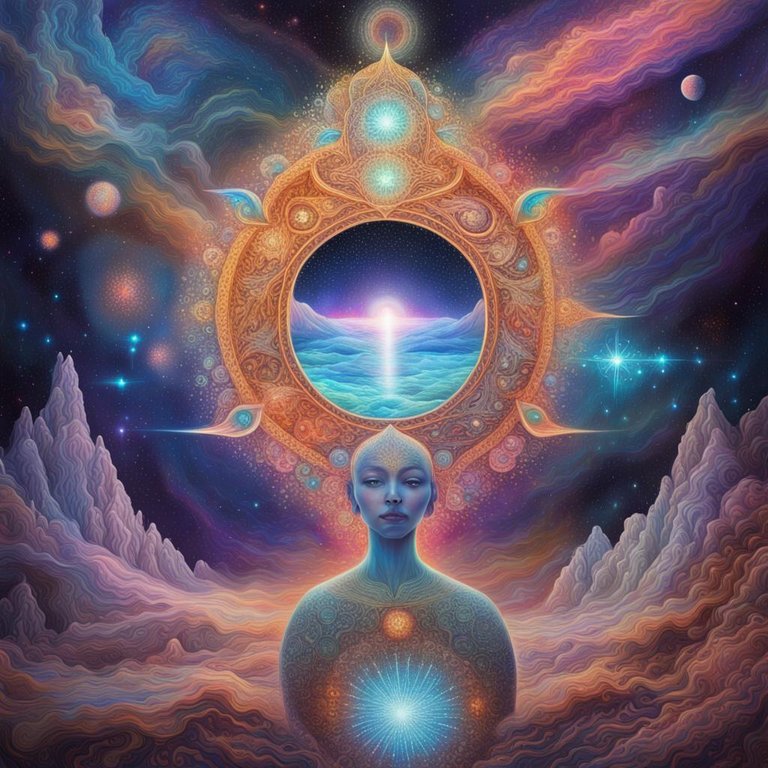
I found this poem beautiful, not because it is relatable, but for its perspective of time. I myself find it incredibly difficult to be present in time; my mind lives in either the past or the future. I've never been able to wrap my head around the "time does not exist" concept, but I find comfort in Dickinson's poem. I especially love the very first line:
Forever is composed of nows
I found that to be very revealing. Often times I perceive "forever" to be a very long time for now, that it is far away in a distant future. But that simply isn't true. "Forever" needs to begin somewhere, it needs to remain constant -- and so "forever" truly is happening this very moment, right in front of us! It's amazing...
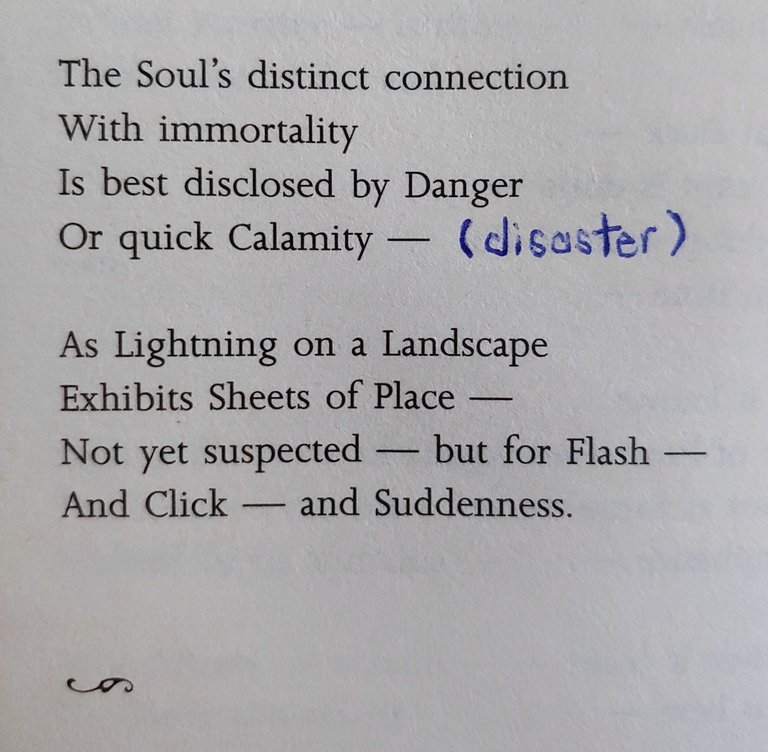
In this poem, Dickinson writes that the illusion of immortality, or the ability to live forever, is best revealed during moments of disaster. More so, she compares the illusion to that of lightning. It is not until lightning flashes that we can finally, clearly see what our surroundings are; yet, as quickly as it appeared, it is gone again. Death approaches us in a similar manner -- completely unsuspecting, a flash, then it is gone.
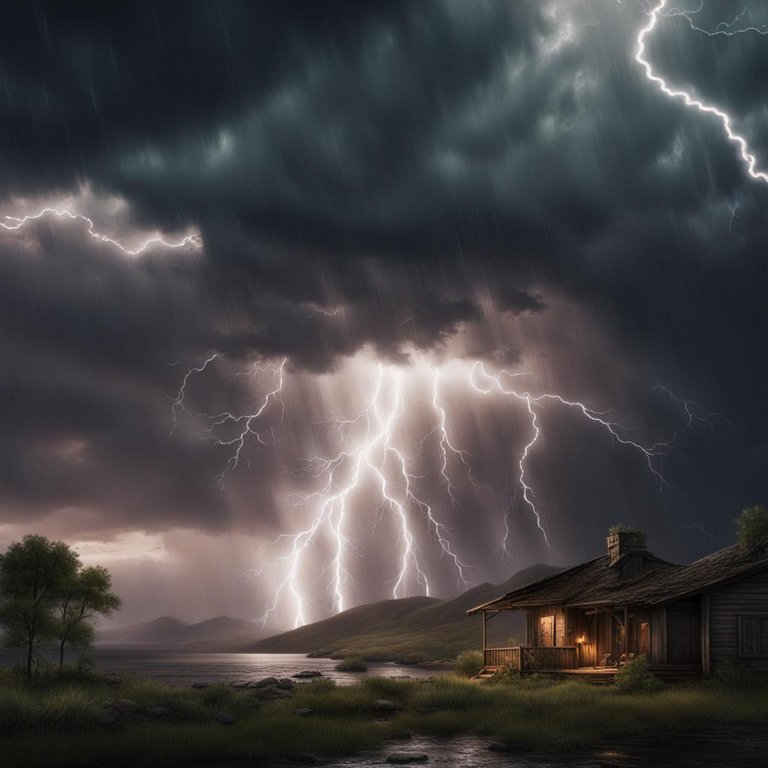
Love love love this poem! We all love to believe in the idea that we will live forever, especially as children. But this is why I fell in love with the analogy of the flash of lightning -- I think it is absolutely beautiful. Perhaps the flash of lightning represents the sudden realization in our minds, that oh yeah, I'm not immortal.. From then on, the flashes become sudden reminders. You have probably experienced it for yourself, where you're having a wonderful time then suddenly remember that, my mother is going to die someday, or I'm not going to live forever; I need to make the moments count..
The flash of lightning could even represent our very last moments on earth, quite literally the "light" that we see before finally passing on. Either way, I think the imagery is extremely accurate, and therefore beautiful. Just like lightning, death is unsuspecting -- we never know when or where it will strike. It catches us off guard, it surprises us. Yet, just as our brains are finally able to register what we're seeing, it is gone. Just like death, we do not have time to think; it is just done.
I also love the way Emily chooses to describe death as "suddenness." Since no one can truly know what awaits us once we are gone, this is such a simple yet powerful way to describe the experience. Everything was, until suddenly it wasn't....
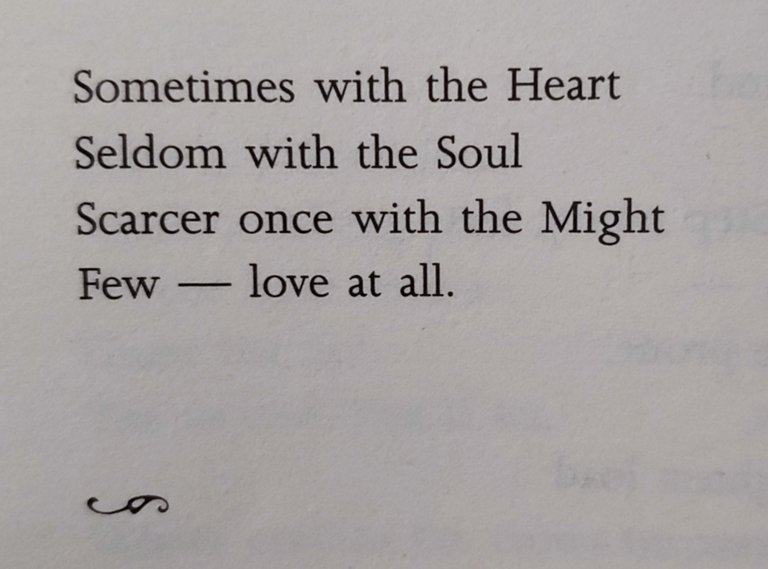
A short one but a good one... and not one that I think requires too much analysis 😅 Dickinson notes that to truly love someone requires all of one's heart, soul, and strength -- and very few people are capable of loving to such an extent. Therefore, very few people love at all.
Again, just a simple poem that really makes you think: to what extent are you willing to love someone else? It is a difficult task that can be exhausting, but it is not one without its rewards. If two people are actively putting in the effort to maintain a healthy relationship, it allows anyone affected by it to flourish.
Similarly, if one chooses not to love with all that they have -- if they halfass love, so to speak -- then their relationships will feel meaningless. Without that sense of deep connection with another person, it feels empty. Yet it is a reality that countless people face, and it's unfortunate that they will go their entire lives never having loved with their whole being.
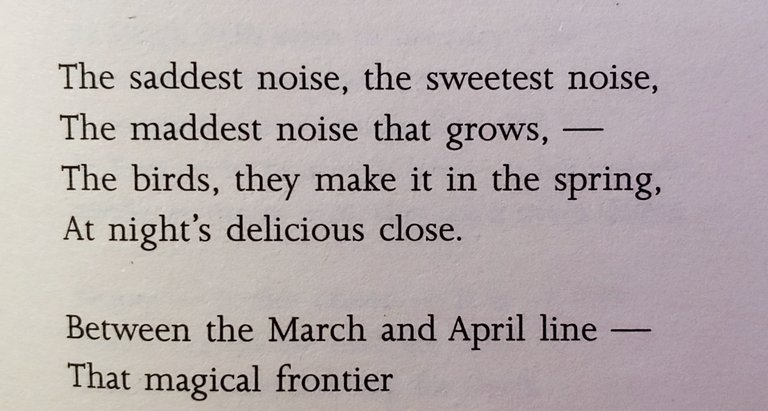
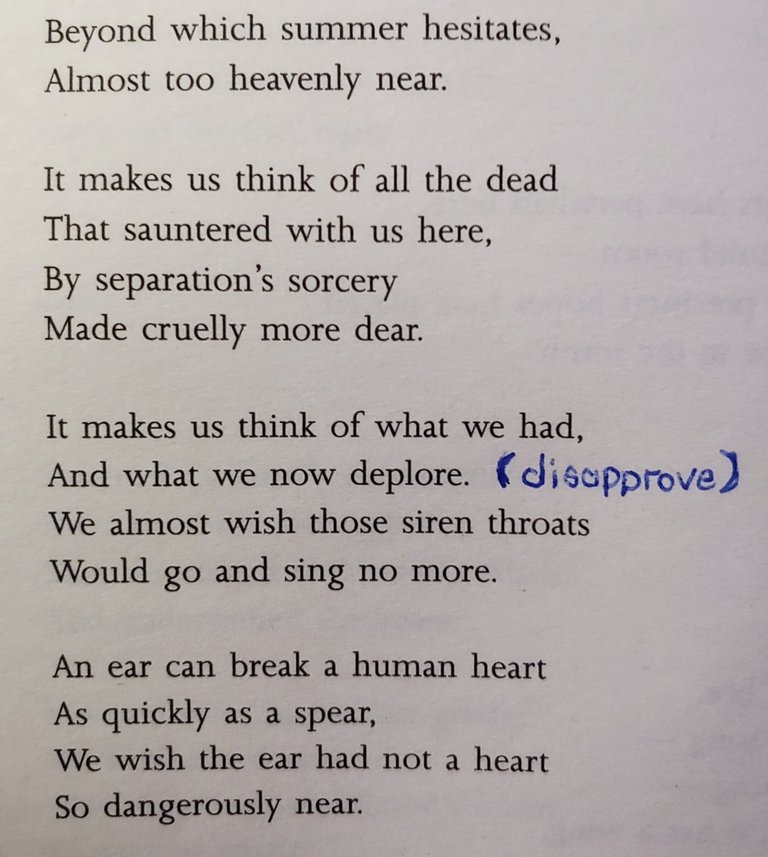
In this poem, Dickinson alludes to the theme of grief once again through birds. She explains that the birds' chirping can be the "sweetest noise," but also the "saddest noise," due to the fact their songs can awaken fond memories. In this case, the birds' songs are sad because they remind Emily of her loved ones that have passed on, who also enjoyed listening to their songs. Because of how painful the memories are, it almost makes Emily wish that the birds would stop singing -- something that she used to enjoy. Dickinson notes that sometimes the emotional things can wound us just as deeply as the physical ones.
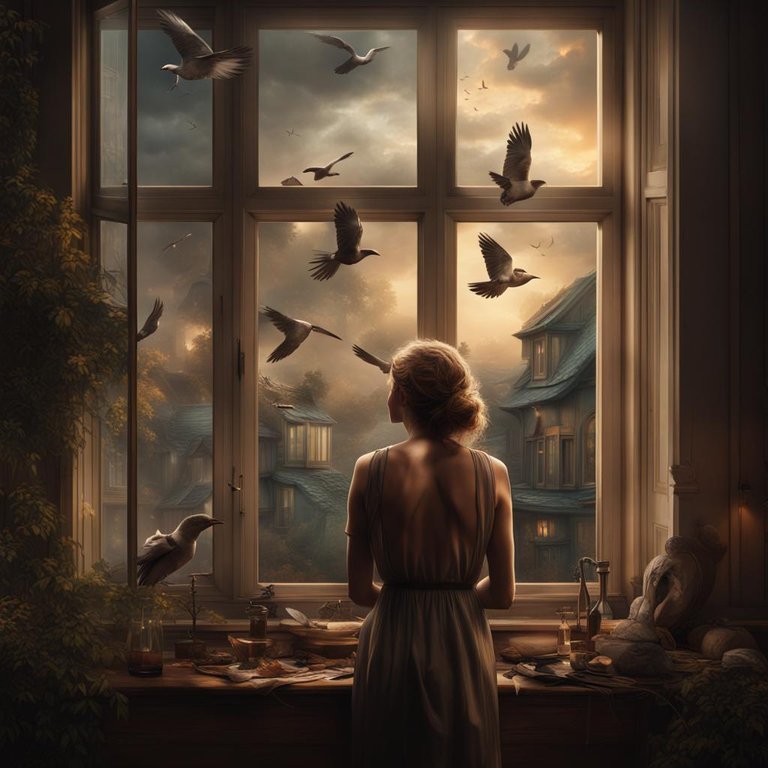
This experience has happened to me countless times; the experience of positive things becoming tainted due to the memories associated with them. My biggest fault is music. So many songs that I love, that used to make me happy, become upsetting because of the memories that come with them. Like hearing a song with my boyfriend, only for the relationship to fail, and suddenly the song no longer feels the same. Each time I would hear it, I would think of him, and the relationship did not end on the greatest terms...
There's really not too much else to say about this one, although I will note that this was the very last poem in the book. I find it a bit ironic, to end the closing of a book on such a bittersweet poem.
Thus concludes my analysis of Emily Dickinson's poems 🙏
As I stated previously, there were a handful of her works that I really enjoyed and found emotionally powerful. However, in terms of being one of history's most profound poets is a bit much for me 😅 Perhaps we simply have more works to compare hers to now, or maybe -- just maybe! -- she wasn't that great to begin with?..
When you really think about it, so long as one was educated, it wasn't a huge feat to be an accomplished writer. Some people couldn't read or write; other people were kept busy providing for their families and didn't have time to expend on the arts. Do you ever notice that "trend"? That some of history's most well-known creators were people who didn't have families, and thus had time to spare for their craft? 🤔
Then take into consideration that Emily Dickinson wrote close to 2,000 poems -- obviously a few hundred of them are going to be some bangers! 😂 But does that mean she should be considered prolific? In my opinion, no.
Not to say that I'm not self-aware either. I have analysed the structures of poems in school, I have dappled in the craft myself. I know that poetry (for the most part) does not just effortlessly flow from the pen; it requires planning, thinking, and feeling. I acknowledge that Dickinson did put effort into her works, and I think they are beautiful for the fact alone that she never intended them to be scrutinized by the public. They were written without being influenced by outside sources, or in other words she didn't write with the intention of impressing others. Despite this, Emily's poems have united people worldwide with the universal themes of beauty, religion, grief, change, and hope.
Maybe that alone is something beautiful; when we all come together and universally agree on something 😄 In this case, the agreement that Emily's poems are beautiful. Although I don't feel she should be considered as "popular" as Emily is, I am not upset that she is, for the world has been gifted with her talents because of it.